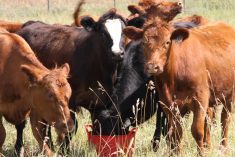A group of eight pregnant heifers in a load of 35 cattle from Ontario were shipped to a Wisconsin packing plant, violating the United States regulations on live cattle shipments.
U.S. officials checked the load at the slaughter plant and discovered the first trimester pregnancies. Later, one of the pregnant heifers was found to be 40 days over the 30-month-old cutoff, said a Canadian Food Inspection Agency official.
All the cattle were killed and processed on Aug. 4 at the Green Bay Dressed Beef company in Wisconsin. Products were shipped to wholesalers in six states.
Read Also

Animal protection delivery to change in Saskatchewan
The Saskatchewan government is looking for a new agency to handle animal welfare after Animal Protection Services of Saskatchewan decided not to renew its contract next year.
The meat plant voluntarily recalled 1,856 pounds of beef that may have contained the backbone of the imported animal after its age was discovered.
“There is no food safety issue with the carcass,” said Francine Lord, of the CFIA.
All specified risk materials except the backbone were removed from the older animal. All fetuses were disposed of in a landfill.
Removing the brains, skull, nerve tissue and glands is considered a control against the spread of BSE. These materials are removed and separated from the human food chain.
The Canadian veterinarian responsible for certifying the animal as acceptable for export has been suspended and an investigation is under way, said Lord.
Under the U.S. Department of Agriculture rule allowing Canadian cattle into the country, no pregnant females are permitted and all must be younger than 30 months.
“We take this very seriously. We have zero tolerance for pregnant females or (cattle) over 30 months,” said Lord.
Cattle under 30 months started moving into the U.S. July 18 after a two year embargo due to BSE.















